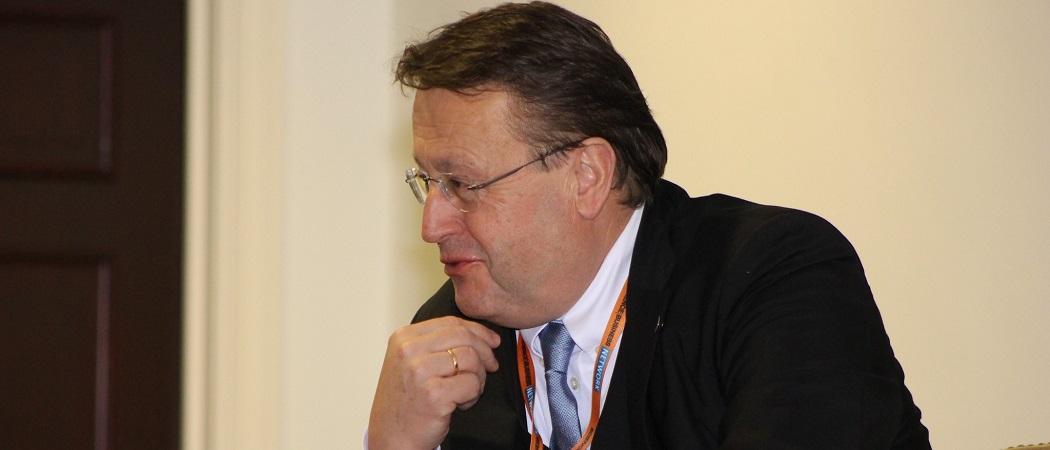Newly appointed to its governing board, former MEP Paul Rübig says the European Institute of Innovation and Technology will play a key role in reviving innovation value chains - from shuttered universities, to cash strapped SMEs, to market

Paul Rübig. Photo: Science|Business, Lysiane Pons.
Long-term stalwart of the European Parliament’s industry, research and energy committee Paul Rübig, is now bringing his expertise to the European Institute of Innovation and Technology (EIT), which he says is poised to play a key role to play in helping Europe’s entrepreneurs recover from the COVID-19 crisis. EIT is, he says, “a very good set-up” that can follow “the newest needs in society”.
EIT’s responsiveness is illustrated by the speedy way in which it has disbursed €60 million to cash strapped SMEs, as part of a COVID-19 rescue fund.
But the structure also allows the EIT to think long-term, Rübig, says, pointing to its plans to establish a new Knowledge and Innovation Community (KIC), focussed on Europe’s decimated cultural and creative industries sector.
Rübig, who joins the board of EIT this month after 23 years in the European Parliament, has long been a proponent of a creating a cultural industries KIC in the EIT. In his last term as an MEP from 2014 - 2019, he was a member of the European Parliament Culture and Creative Industries group, which lobbied for the sector’s interests.
While culture and creative industries may in many senses represent Europe’s past glories, it is also a hugely innovative sector. And as the lockdown closure of museums, theatres, concert halls, arts centres and book shops underlines, it is also a really important part of Europe’s economy, supporting tourism, providing hundreds of thousands of jobs, and contributing to the health and wellbeing of citizens.
Given this, Rübig believes it is now more important than ever to get the cultural industries KIC off the ground. “After COVID-19 this area has suffered the most. Of course, we have to learn to live with COVID-19, therefore an adaption process and innovation would be very necessary and very helpful in this area,” he told Science|Business.
Although on the drawing board for some time, there is still no firm date for when the creative KIC will launch. That does not signal urgency, but Rübig notes that establishing a new KIC is a legal process; the speed of establishing one depends on EU policymakers’ willingness to act fast.
Rübig also spoke in favour of another proposed ‘Blue’ KIC fostering innovation related to Europe’s seas and inland waterways. He says Europe is already ahead of rest of the world in the development and adoption of a sustainable approach to the blue economy and believes it can be a market leader.
The two new KICs will join eight existing innovation communities, which are pan-European networks bringing together companies, research centres and universities around themes including climate change, food and energy.
Alongside the brief to nurture innovation and generate growth through job creation and the formation of new companies, KICs has a third, and for Rübig, critical duty, in educating the next generation of entrepreneurs.
He says that post-pandemic, the new KICs and their existing counterparts should reinforce their focus on education. In future he says, “We plan to be closer to universities and higher education sectors.”
In particular, he wants to see EIT take a lead in inspiring girls to study mathematics, informatics, natural sciences and technology. Another focus should be on vocational training for adults. Reskilling and training people to work in emerging industries is getting increasingly important, Rübig said.
This is a key mission for Europe as a whole. “If we give young people an incentive [to innovate], it would have not only a big effect on business and education, but also the economic situation on the global value chain,” said Rübig.
In some senses, EIT can now be viewed as being in the shade of its younger - much bigger - sibling, the European Innovation Council (EIC), the new agency that is due to be fully launched next year as key element of the Horizon Europe research programme.
EIC has certainly been more to the fore during the pandemic, getting an extra €150 million from the commission to address the crisis and organising a number of high profile events, such as hackathons and procurement sessions, mobilising European SMEs in the fight against COVID-19.
Rübig believes the two institutions complement each other. While the EIC will focus on longer-term investments through its venture fund, the EIT’s KICs can mount a faster response to Europe’s urgent needs along the entire innovation chain.
New budget, new rules
Under Horizon Europe, EIT will have a new budget and a less bureaucratic structure. However, as yet, neither the budget nor the new rules have been approved by EU policymakers and there are a number of imponderables.
Rübig, who in addition to sitting ITRE, was a long-time member of the parliament’s budget committee, is a proponent of an ambitious Horizon Europe programme, which he refers to as, “the cornerstone of the future of European development.”
The more that is invested in research and innovation, the more jobs and growth are created. Cutting the budget for Horizon Europe, as the Council President Charles Michel proposed last week, is “a totally wrong message to the public”, said Rübig.
The bigger the budget, the more the EIT can do in its mission of combining the knowledge triangle of innovation, research and education to make Europe more innovative and aid post-COVID recovery. This “could help get Europe onto better performance in world value chains,” says Rübig.





 A unique international forum for public research organisations and companies to connect their external engagement with strategic interests around their R&D system.
A unique international forum for public research organisations and companies to connect their external engagement with strategic interests around their R&D system.